Holocaust Memorial Day marked by University
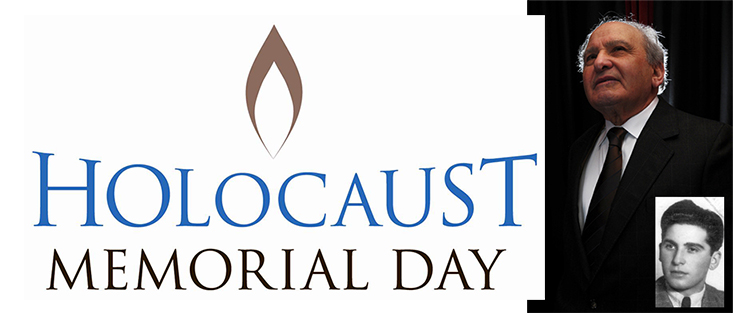 Holocaust survivor Eugene Black
Holocaust survivor Eugene Black
Tue, 02 Feb 2016 12:16:00 GMT
The 2016 Holocaust Memorial Day Lecture was delivered by Lilian Black, daughter of Holocaust survivor Eugene Black
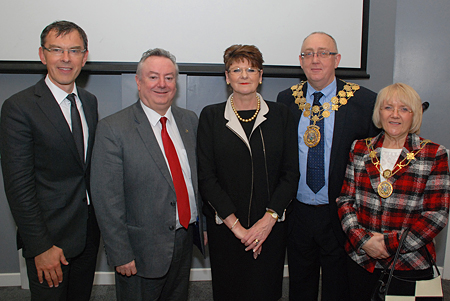 ► Pictured with guest speaker Lilian Black (centre) are (l-r) Deputy Vice-Chancellor Professor Tim Thornton and Vice-Chancellor Professor Bob Cryan with the Mayor of Kirklees Cllr Paul Kane and the Mayoress Susan Bedford.
► Pictured with guest speaker Lilian Black (centre) are (l-r) Deputy Vice-Chancellor Professor Tim Thornton and Vice-Chancellor Professor Bob Cryan with the Mayor of Kirklees Cllr Paul Kane and the Mayoress Susan Bedford.
THE story of the Holocaust includes the ordinary people who stood by and watched, or actively aided the Nazis when Jews and other groups of victims were rounded up and despatched to the death camps. When she gave the University of Huddersfield’s annual Holocaust Memorial Lecture, Lilian Black – who is the daughter of a survivor – confronted the audience with a moral dilemma. What would they have done?
The nationwide theme of the 2016 Holocaust Memorial Day was Don’t Stand By, and this was explored by Lilian, who chairs the Holocaust Survivors Friendship Association in Leeds. Her father Eugene Black, born a Hungarian Jew, settled in Britain after surviving Auschwitz, Buchenwald, the slave labour camp of Mittelbau-Dora and finally Bergen-Belsen, liberated by the British Army in April 1945 – although 16,000 prisoners were by then so weak that they could not survive.
Mr Black, now in his late 80s, met and married a British woman and when he settled in the North of England he developed a successful career with Marks and Spencer. He has spoken about his experiences to thousands of people, his daughter told the University of Huddersfield audience.
“He does not attribute himself with any special survival skills, nor will to live. In fact, he thought about throwing himself on the electric wire sometimes. He believes his survival was down to luck and always trying not to be at the end of a row, always in the middle, to avoid the blows, keep your head down and obey orders.”
It was his experiences after liberation and coming to Britain that revealed the better side of humanity, said Lilian. There were many acts of kindness “that brought my father from darkness back to the light of the world”.
Don’t stand by
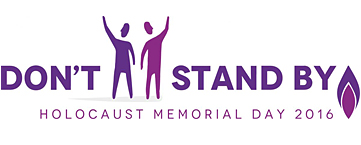 In the course of a lecture that was structured around an engrossing narrative of her father’s harrowing experiences – including the extermination of his family – Lilian explored wider issues that have continuing relevance.
In the course of a lecture that was structured around an engrossing narrative of her father’s harrowing experiences – including the extermination of his family – Lilian explored wider issues that have continuing relevance.
Referring to the Holocaust Memorial Day theme, she said: “My father’s story is one in which people did stand by. They not only stood by, but ordinary people like you and me actively participated in the state-sponsored murder of six million Jewish men, women and children and five million Roma, Sinti, people with disabilities, Jehovah’s Witnesses, gay people, Soviet prisoners of war, political opponents and just about anyone who did not ‘fit in’.”
Whether they drove the trains or helped with the deportations or filled in the paperwork, each action contributed to the ultimate outcome of genocide, continued Lilian.
“While there were examples of people who did not stand by and who acted with great personal courage, by and large the system and values of National Socialism were so well organised and embedded across Europe that nothing short of the Allied invasion to free Europe could stop it.”
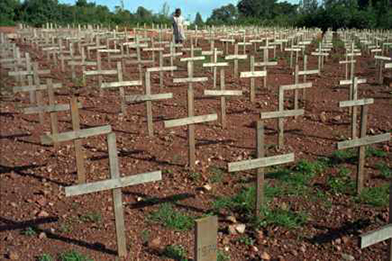 Even when the war was lost, Nazi Germany continued with its ideology-driven murder, said Lilian.
Even when the war was lost, Nazi Germany continued with its ideology-driven murder, said Lilian.
“Hundreds of thousands of concentration camp prisoners who had performed slave labour in businesses such as IG Farben and Krupp in plain sight of local populations were sent on death marches and transports, dragged all over Europe in unspeakable conditions, to conceal their crimes from the advancing allies.
“This experience left humanity with a terrible stain and legacy and even today we are left asking what we would have done in similar circumstances. How can it be that our neighbours can participate actively in murder or just stand by and watch? And we must not forget similarities with Srebrenica and Rwanda.”
►Genocide graves in Rwanda
The challenge now was to acknowledge parallels between the Holocaust and today’s humanitarian crises, argued Lilian.
“When I see people having numbers put on their arms at the borders of Hungary, or asylum seekers made to wear red bracelets to get their food, I think how unspeakable this is and I wonder why people don’t know their history, or I harbour fears that perhaps they do know it but don’t care,” said Lilian, adding that the
key question is “What can I do?”
“Each of us must answer this question or risk being a bystander”.
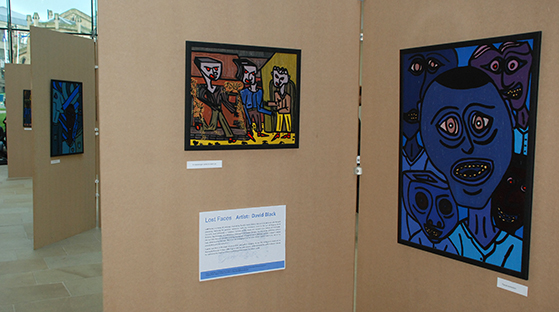 Centrepiece
Centrepiece
The Holocaust Memorial Lecture was the centrepiece of a sequence of events at the University of Huddersfield on the theme of Don’t Stand By, including an exhibition of paintings by Eugene Black’s son David, inspired by his family history.
The events were organised in conjunction with the charitable trust 6Million+ and Kirklees Council. Lilian Black’s lecture was introduced by the Mayor of Kirklees, Councillor Paul Kane, who said: “We cannot let memories of the Holocaust disappear. It is vital that young people know what happened in the past so that they can learn for the future. Don’t forget that genocide is still happening today.”
Before embarking on her lecture, Lilian Black spoke of plans to establish a Holocaust Heritage and Learning Centre for the North at the University of Huddersfield, which had been chosen because “this university had demonstrated great commitment to the values that I know we share,” said Lilian. The Centre would fill a major educational gap in the North of England, she added.







